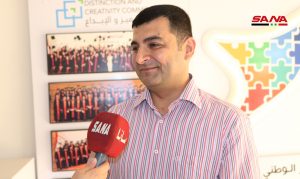Lattakia-Sana
With the participation of 198 male and female students who collaborated in presenting 33 scientific research projects in the basic scientific disciplines, the eleventh scientific research conference held by the Center was launched today as the important scientific station within the strategy of the Excellence and Creativity Authority in building generations distinguished by specialized sciences and creative in innovation.
And Al-Qubaili indicated that the conference also aims to develop time management skills and the way the project is presented before the competent arbitration committee by team members for each project within 15 minutes, pointing out that the conference includes some huge scientific projects that take two years to complete.
Among the projects that will be presented at the conference and characterized by their ideas and goals, as Dr. Al-Qabili says “artificial nerves” and “biometric data security” and “exploration submarine WD7 ″ and“ 3D scanner ”and“ directing sound waves ”and“ spying by laser ” And “semi-perpetuating water engine”, “noise electric generation”, “lifting objects using ultrasound,” “studying and designing a three-dimensional model of an upper artificial limb,” and “predicting currency rates using machine learning algorithms”.
Among the research projects are also: “cultivation of economic and medicinal plants by the glass and extraction of raw compounds from them” and “developing the biological filter and testing its effectiveness in water purification” and “contributing to the assessment of the impact of noise on the rate of growth of neighborhoods” and “the effect of onion extracts on leishmania” and “detection Beta thalassemia mutations in the Syrian coast, "the extraction of precious metal cations by selective organic hosts", "heat sensitive polymers to verify the efficacy of some types of drugs" and "synthesis of lactic acid polymer in a new way."
For his part, student Yunus Shiha, a “third secondary” who presented with his team of six people, explained how to extract precious metals such as gold, silver and platinum from secondary sources and not from natural raw materials, while student Hussam Ezzo, who won the bronze award at the Colmogrove conference for research articles in the Russian Federation The project enables the production of precious metal cations by selective organic hosts that do not affect the environment and can be reused.
The most recent National Center of Excellence in 2009 is considered one of the three departments of the Excellence and Creativity Commission in addition to the scientific Olympiad and academic programs. The Center works to care for distinguished students who have a basic education certificate through teaching and supervising them scientifically, psychologically, socially and educationally.
Fatima Nasser

